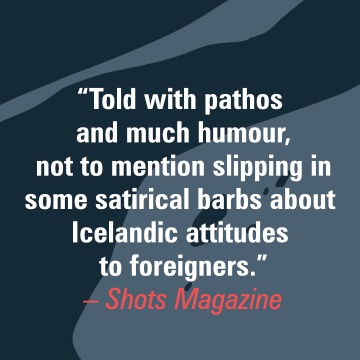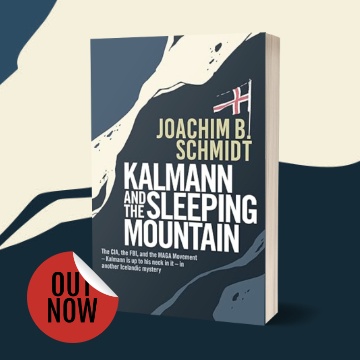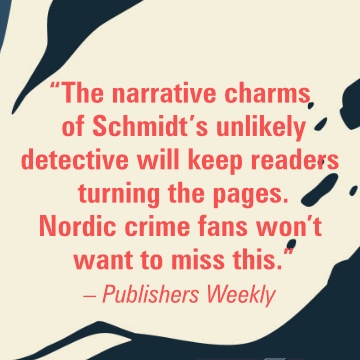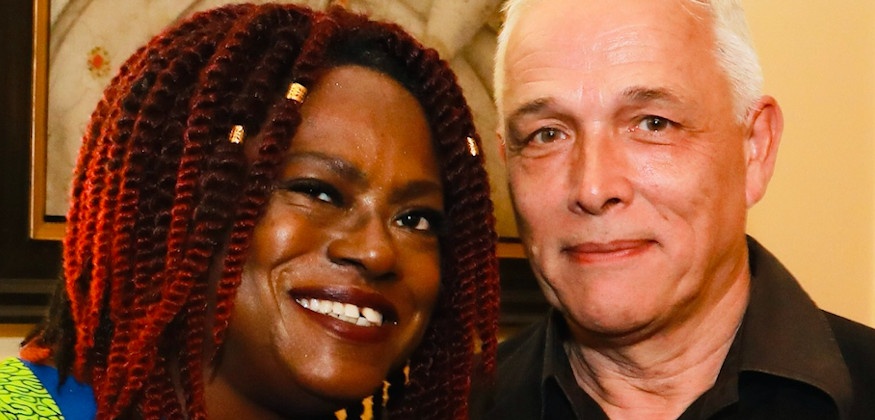
There was fantastic news for the crime fiction community at the end of 2019 when the London-based author Dreda Say Mitchell was awarded an MBE. She’s now one of the Queen’s trusted knights, a Member of the British Empire, recognised for her services to literature alongside her work with young people and prisoners. A CWA New Blood Dagger award winner in 2005 for Running Hot, Dreda’s crime writing career began with East End gangland thrillers. Today she works alongside co-writer Tony Mason (pictured with her at Buckingham Palace, above) and their first psychological thriller, Spare Room, came out last year. Because the author’s latest book, Trap Door, is scheduled for February, we were already lining up an interview with her, so the honour she’s just received gave us even more to talk about…
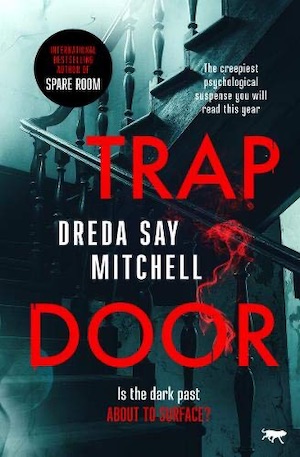
First of all, what are crime fiction lovers going to love about Trap Door?
Trap Door is a racy and pacy psychological-thriller-horror with plenty of twists and creepy turns. Rachel, a young woman desperately in debt, finally thinks her financial nightmare is over when she bags a great paying job. But her nightmare is just beginning when the job turns out to be in a building that has a horrifying history in the part of London where Jack The Ripper once stalked the streets. I think that readers will love the darkness of this setting. Crime readers love a cracking guessing game and Trap Door keeps readers on their toes. How Rachel and the other characters deal with their secrets and traumas I hope resonates too. And it’s a very contemporary story, very of the moment. That has always been important to me as a writer.
But that’s not the only exciting thing going on for you at the moment, is it. Tell us about your MBE. What was it like to receive that honour?
It was a complete shock. When I received the official letter from the British government’s Cabinet Office, I thought I must be in trouble of some sort. When I realised what it was, I was speechless and that’s saying something because I’m a woman of many words. I received an MBE for services to literature and the education work I do in prisons. So thrilled and totally humbled. I’ve contributed to public life in various ways over many years and to have that work recognised at the highest level was, to coin a phrase, a great honour.
They always say things like ‘for services to literature’ when they give out honours like this. You’ve done a lot of work with people from minorities, and with prisoners and their writing and literacy. Can you tell us more about that and what it was you think the Queen wanted to recognise?
I grew up – and still live – in the East End of London, an area that’s been associated with grinding poverty over the centuries. Way too many young people who I grew up with, especially men, ended up behind bars. I’m a strong believer in rehabilitation. Reducing reoffending rates means less crime but the only way that can happen is if the people leaving prison have skills to re-engage with society. Someone I grew up with who managed to break the chains of going in and out of prison once told me, ‘It’s not going in prison that’s the problem, it’s coming out.’ My contribution has been to develop reading and writing skills and to use my life story as a springboard to talk about the barriers I faced and how I overcame them. This can sometimes be difficult and challenging work but I strongly believe in it. When prisoners tell me I’ve made a difference to their lives or if my students win awards that validates what I do. I hope now my honour validates it at a public level.
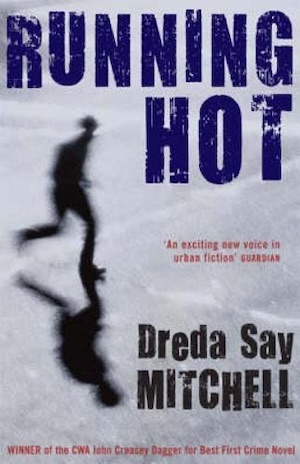
Does the work you do with disadvantaged people and prisoners inform your writing in any way?
It did more so in the earlier parts of my writing career. My first novel, Running Hot, is a chase thriller about a young man trying to break the cycle of going to prison. I wanted it to have a certain type of ending because I was tired of reading stories or watching TV where the black character ends up dead by the end. The characters in my grittier gangland books represent the many strong women who lived on my block as child. These were some powerful women! Now my writing reflects other issues. A couple of years ago we took in a lodger at our house. That experience helped me come up with the concept for my first psychological thriller, Spare Room. I’d hasten to add though that any resemblance between the characters in Spare Room and three of us is purely coincidental.
You work closely with Tony Mason to produce your books, don’t you? What different things do each of you bring to the collaboration?
We began formally working together on my sixth novel, Vendetta. We’re very different people with very different experiences and perspectives. I’m a black woman from a migrant background who grew up in an inner city block in the heart of London. Tony’s a white guy from a traditional British working-class family. At the same time, there are similarities; we were both raised in families with very little money and we were both the first in our families to go to university. Our ideas tend to be a fusion of these experiences. Tony’s a whizz at plotting and I focus on the characters. The writing style is mine because it was already set by the time Tony joined me on my writing journey. Collaboration works for us and I always think it’s better to have two pilots in the cockpit rather than one. Even if the turbulence can make the ride a little bumpy sometimes!
Getting back to Trap Door – where did the inspiration for it come from, with its links to the past, and people being trapped in dangerous jobs?
We try to pin our fiction to what we see going on in the world around us. Many people in the modern world have had the experience of having their backs to the wall financially and being forced to take poorly paid jobs that they know may not be good for them. This experience used to be mainly that of the poor but increasingly, in the short-term employment contract economy or gig economy as we call it in Britain, it’s starting to be the case for people of other backgrounds too. Both Tony and I have had experiences like that. So we thought – let’s take that idea and turn it into a psychological thriller with a lashings of horror.
What is the main character, Rachel, like?
She’s the daughter of a self-made man who rose from nothing to become a wealthy businessman. That should have given her all the advantages in life. But wealth is no defence against trauma and Rachel has a lot of trauma from past events to deal with. How she deals with it forms the spine of the book.
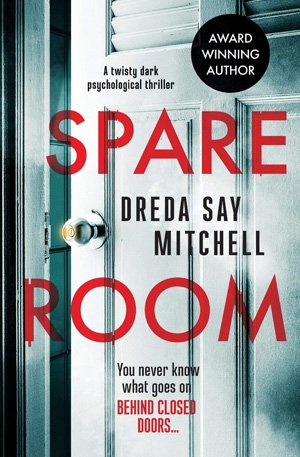
Like Spare Room, this one is a psychological thriller and rather unlike the East End gangland stories you used to write. What made you decide to change style?
It was a number of things. I’ve never been happy with the idea that you have to stay in your lane when writing books. Very few people read only one type of fiction so why should writers only write one style of book? Then the fab Bloodhound Books came calling with a view to writing a crime novel for them on any subject I liked. So Tony and me thought, we like psychological thrillers and horror, so why don’t we write one? But I will still be writing my grit-lit gangland books.
Which other crime authors have inspired you, and what are you reading at the moment?
I’ve too many influences to mention and my writing hasn’t just been steered by crime writers. I’ve noticed that many successful writers I admire are often borrowing ideas, styles and tropes from across the board when it comes to fiction. I was interested to read in an article that Albert Camus was a big fan of American detective noir. But if I have to name names, I’m a big fan of Chester Himes, while among contemporary writers, I find Lee Child a master craftsman. I’m re-reading Alice Walker’s The Colour Purple. It’s a book that blows my mind every time.
Way back in 2005 you were the first black woman to win the CWA John Creasey New Blood Dagger with Running Hot. Since then how much have things changed for BAME crime authors?
There’s still not many of us and there’s a lot of debate about why that is. Access has always been a problem for writers of colour and other marginalised groups in society. When we do manage to get our foot in the door there’s still a huge level of pressure on BAME authors to stay in their lane and only write about ‘black’ issues. That’s fine if that’s the direction authors want to go in. But I’ve always said if BAME authors want to write romantic comedy, sci-fi or horror, they shouldn’t let themselves be deterred. It’s as if the publishing industry thinks that writers of colour live their whole life through the colour of their skin. I don’t wake up every morning, look in the mirror and think, ‘Wow, I’m black’ and think that is the most dominant thing I should think about all the time. I’m a writer who is black, who’s a woman, who grew up in East London, whose parents are from Grenada… You get it; I’m a person with multiple identities.
Are there any new BAME crime authors you’ve discovered that we need to look out for in 2020?
Amer Anwar is a name to look out for. His gutsy, gritty crime debut, Brothers In Blood is set among the Indian migrant community in Southall, London. I can’t wait for his next novel to hit the bookshelves. Hurry up, Amer!
What’s next for Dreda Say Mitchell?
Too much really! We’ve got a couple of film/TV projects in development so Tony and I are off to Los Angeles later this spring in connection with that. We’re also mapping out several new novels that we’ll begin writing in the coming weeks. And of course, I’ll be buying a new outfit – plus fancy hat – to wear when I go up to Buckingham Palace to collect my honour. For Dreda from the block that will be quite a change of scene.
Watch for our review of Trap Door soon on Crime Fiction Lover. It’s released on 11 February.







